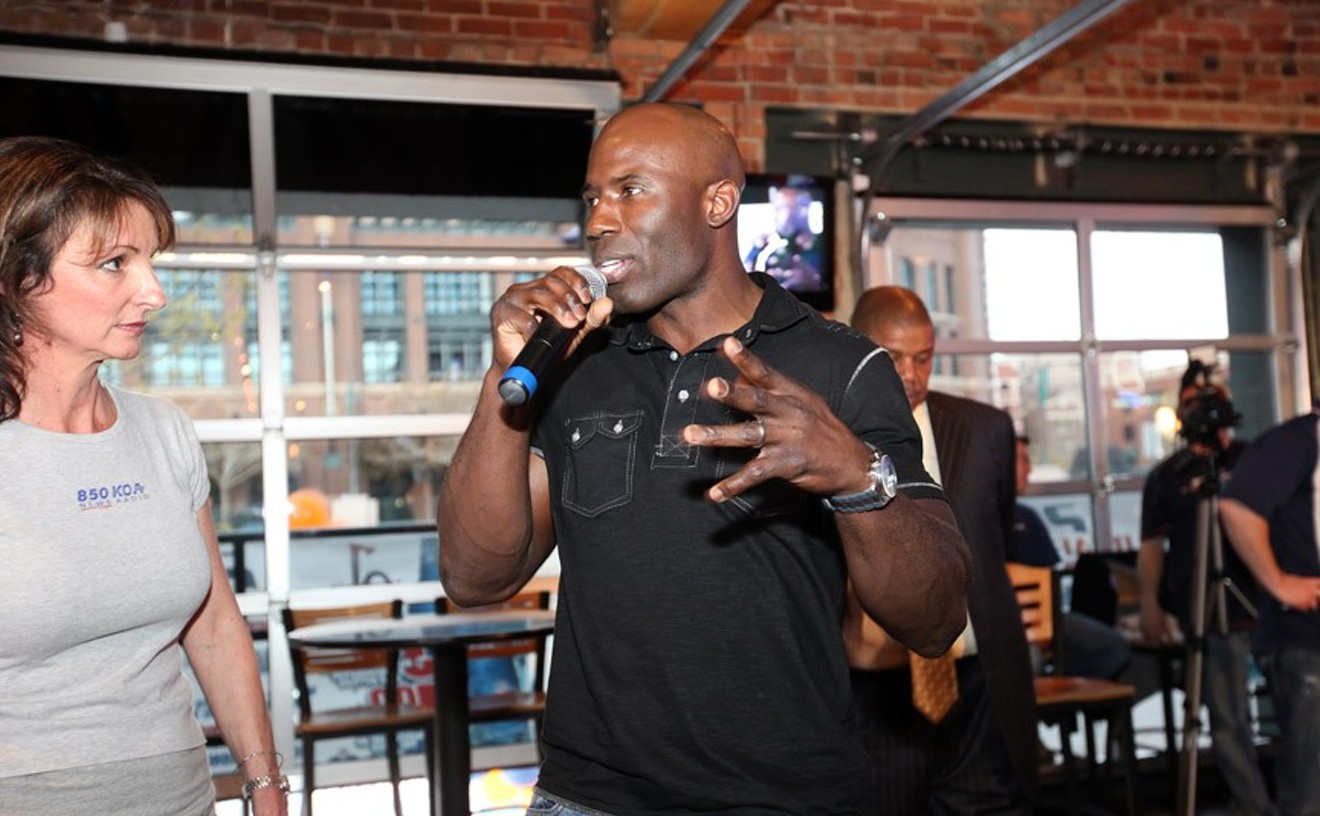The announcement yesterday of an extensive realignment at the department is intended as a step toward these goals. As reported by the Denver Post, White told the Denver City Council's public-safety committee that he wanted to flatten the command structure, get more officers on the street and create a force that was more responsive to the community.
The moves include eliminating the rank of division chief and two of four deputy chief positions -- meaning that Michael Battista and John Lamb will be put in the ignominious position of reapplying for a commander job if they want to stick around. In addition, plenty of tasks will be handed in part or as a whole to civilians, topped by the overseeing of photo radar -- a controversial area given the recent controversy of inaccurate red-light-camera-revenue figures released to 9News, not to mention a failed bill to eliminate such cameras throughout the state.It's too soon to tell what practical effect such tweaks will have. But White's approach to sharing this information is to be commended. During his early weeks and months on the job, he hasn't hidden himself away behind a desk. Examples: He was on the scene during the Fuck the Police march, and he personally met with Occupy Denver representatives last December shortly before an eviction order was enforced.
Of course, the eviction that followed ended in flames, arrests and Tebowing -- not ideal in at least two of these cases. But White has dealt with these and other situations with more openness than his immediate predecessors, and the emphasis on communication and social media in his announcement suggests that his commitment to transparency may be more than spin.
Look below to read White's letter to the DPD about the realignment, as well as to see photos and biographies of newly named deputy chiefs David Quinones and William Nagle.
Letter From Chief Robert C. WhiteTo all Denver Police Department employees:
Today, I am announcing departmental changes to you prior to the announcement this afternoon to the media. I am releasing information ahead of schedule from the initial e-mail I sent eleven days ago because I am aware of how difficult it is waiting to see the impact of upcoming changes on your current assignment.
SELECTION OF DEPUTY CHIEFS
First of all, I am pleased to announce my selection for Deputy Chiefs:
Division Chief David Quinones will be promoted to the position of Deputy Chief of Operations.
Captain William "Bill" Nagle will be promoted to the position of Deputy Chief of Administration.
While I'm announcing our new Deputy Chiefs, I also want to recognize the significant contributions of Chiefs Michael Battista and John Lamb.
In his role as Deputy Chief of Operations, Chief Battista oversaw the Safety and Security Planning for the Democratic National Convention along with many other significant events. His collaboration and leadership throughout the DNC played a key role in the success of the event and the worldwide recognition received by the City of Denver and the Denver Police Department.
Deputy Chief John Lamb has also contributed greatly to our organization. Chief Lamb played a key leadership role in the development of the Discipline Matrix and steered our department through significant budgetary challenges, minimizing the loss of Career Service personnel and ensuring that no sworn personnel were laid off. Budget challenges are still ahead, but Chief Lamb has set our department up to deal with these challenges from a position of strength.
NEW ORGANIZATIONAL STRUCTURE AND TIMELINE FOR IMPLEMENTATION
The new organizational structure and timeline will be released on the DPD website, www.denvergov.org/followdpd at 1:30pm this afternoon. The documents are still subject to change as we move forward.
Here are some of the key changes outlined on the organizational chart and timeline:
· The Deputy Chief of Administration will oversee the following areas of the department:
o Public Affairs
o Denver International Airport
o Internal Affairs
o Administrative Management
o Financial Services
o Crime Lab
· The Deputy Chief of Operations will oversee the following areas of the department:
o Patrol Districts
o Major Crimes Division
o Narcotics/Vice/Intel/Gang Division
o Special Operations
· The rank of Division Chief will be eliminated.
· The department will have eleven Commanders.
· Personnel assigned to Assaults and part of Robbery will be reassigned to District Investigations.
· Part of Gangs and Narcotics will be reassigned to Patrol.
· The Complex Investigations Unit will be eliminated.
· The following units may be fully or partially civilianized over time:
o Public Nuisance and Abatement
o Photo Radar
o Volunteers in Policing
o Crisis Intervention Team
o Information Management
o Court Liaison
o Information Desk
o Inventory Control
o Crime Scene Investigation Unit
o Computer Crime
o Property Management Bureau
o Identification Section
SELECTION PROCESS FOR DISTRICT COMMANDERS
The selection process for District Commanders will begin with the creation of a District Commander Selection Board. The board will be made up of one representative selected by each member of City Council, totaling 13 members. In addition, both Deputy Chiefs will participate in the process as board members.
I am requesting a letter of interest and resume from the department's Civil Service lieutenants and above interested in applying for District Commander positions. All applicants will also need to submit a Cuff report covering the last five years. Complete packages should be submitted to my office by noon, Thursday, March 15, 2012.
This process will occur quickly through the month of March, with the Board submitting an unranked list of the top twelve candidates to me by March 23, 2012. I will select and announce our new District Commanders by Friday, March 30, 2012.
SOCIAL MEDIA
The department has active Twitter and Facebook accounts and I encourage all of you to follow the entries if you are interested in receiving timely information when you are off duty.
Twitter: www.twitter.com/denverpolice
Facebook: www.facebook.com/denverpolice
Announcements will be made on these sites at the same time as information is released to the media.
OPEN DOOR POLICY
I have an open door policy. Please contact me if you have any suggestions or comments as we move forward in this process. More information will follow in the weeks to come. I look forward to working with all of you to successfully implement productive changes to our department.
You can also send your questions to [email protected]. We will be creating a Question and Answer section on the Intranet as a resource for employees.
Deputy Chief David Quinones Denver Police DepartmentDeputy Chief Quinones has served the citizens of Denver for more than twenty -six years in a variety of assignments with the Denver Police Department. He began his law enforcement career on January 1, 1986, when he was sworn in as a Patrol Officer.
As a Patrol Officer, Deputy Chief Quinones worked in many Districts throughout the city. In 1991, he was selected to join the Gang Unit. He worked in this assignment for five years, which included the "Summer of Violence" of 1993. After being promoted to the rank of Sergeant in 1996, Deputy Chief Quinones worked in District One, Internal Affairs, and the Vice/Drug Control Bureau.
In November of 2000, Deputy Chief Quinones was promoted to the rank of Lieutenant. He served in District Six before returning to the Internal Affairs Bureau, overseeing investigations of allegations of police misconduct. Several years later, in September of 2003, Deputy Chief Quinones was appointed to the rank of Commander, and served the northwest Denver community as the Commander of District One until January of 2007. At that time, he was promoted to Division Chief and assigned to lead the Special Operations Division. He served in that capacity until May of 2010, when he assumed command of the Patrol Division.
Throughout his career, Deputy Chief Quinones has strived to improve police relations with the community. During his tenure as the Commander of District One, he stressed the importance of community outreach and a strong partnership between citizens and officers. He feels strongly that trust is essential for the success of the Department, both internally and with the community. In addition, being bi-lingual has enabled him to reach out to, and interact with, the Spanish-speaking segment of the population.
Deputy Chief Quinones proudly serves the Denver Police Department and recognizes that the vast majority of its members are dedicated officers who regularly perform exceptional work under challenging circumstances. However, he is also a firm believer in holding officers accountable for their conduct. This ensures a high standard of excellence and that the goal of gaining the trust of the community is met while officers work to ensure the safety of our community.
In 1985, Deputy Chief Quinones received a Bachelor of Science Degree in Criminal Justice, with a Minor in Political Science, from Metropolitan State College. He has attended the Police Executive Research Forum - Senior Management Institute for Police.
Deputy Chief Quinones is married and has three children.
Deputy Chief William "Bill" Nagle Denver Police DepartmentAfter coming to Denver as a geologist in 1979, Deputy Chief Nagle decided to change careers and was sworn in as a Denver Police Officer in 1988. He has worked in numerous assignments during his time on the department and utilized his skills as a geologist to introduce geologic mapping techniques for tracking of Denver crime statistics.
Deputy Chief Nagle was promoted to Sergeant in 1995, serving in far northeast Denver's District Five. After his promotion to Lieutenant, he continued to work in the Patrol Division in both Districts One and Two. In 2005, Deputy Chief Nagle was selected to develop and implement a formal crime analysis unit utilizing Comstat, a nationally recognized managerial accountability system. In 2008, he was assigned to the Vice Drug Control Bureau where he developed a strong expertise in the areas of medical marijuana, prescription drug abuse and sex trafficking. He currently serves on the Denver Drug Strategy Commission.
The Democratic National Convention brought opportunities and challenges to Denver in 2008. Deputy Chief Nagle was instrumental in the development of a crowd management/crowd control system. More than 1,500 officers from Denver and surrounding law enforcement agencies were trained. The success of the convention and police department use of the system during daily protests was highlighted in a presentation Deputy Chief Nagle gave to the International Association of Chief's of Police conference in 2009.
Deputy Chief Nagle is a firm believer that community members and police officers must work together to create a vibrant city that embraces diversity and respects the rights of all. A long time Denver resident, he believes that our city benefits from the contributions and values of our citizens. Creating a solid partnership between our department and the community, we can prevent crime and make Denver a great city in which to live and work.
Deputy Chief Nagle has a Bachelor's Degree in Geology from the College of William and Mary from 1976 and graduated in 2009 from the FBI National Academy with a graduate level certificate.
He is married to a fellow Denver Police Officer and has four children.
Follow and like the Michael Roberts/Westword Facebook page.
More from our News archive: "Laura Bradford: Denver Police apology for special treatment step toward openness."











